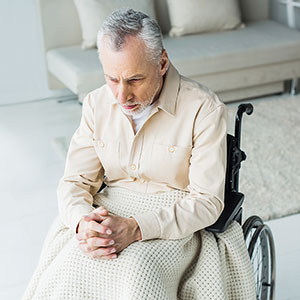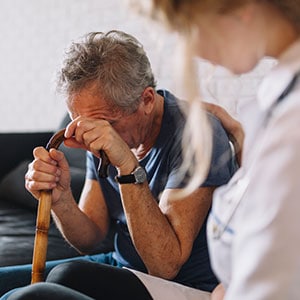As our loved ones and family members age, we face the difficult decision of asking others to care for them in nursing homes and assisted living facilities. We want the people we care about to be able to live out their final years with dignity and grace and be assisted with their day-to-day needs.
Unfortunately, many nursing homes and assisted living facilities fail to meet a minimum standard of care. Through neglect or outright abuse, they cause harm to those in their care. This can result in trauma, medical emergencies, financial exploitation, and even death.
If you or someone you love has been physically or psychologically injured through nursing home abuse or negligence, you are entitled to compensation and justice. At Peton Law, we are passionate and skilled nursing home negligence attorneys who will fight for you and your loved ones.
Reasons for elder abuse and nursing home neglect
Many nursing homes genuinely care about the well-being of their residents. Unfortunately, some are less scrupulous. Nursing homes are often understaffed and the stress of the work emerges as neglect or carelessness. Low pay, lack of training and inexperience also contribute to neglect by encouraging an attitude of indifference or apathy. Poor management and supervision can also be a factor in elder abuse.
Whatever the reason, there is no excuse for elder abuse. The attorneys at Peton Law can help you get financial reparations, secure better placement for your loved ones, and ensure that no other family ever endures the same neglect or abuse.
NURSING HOME NEGLECT BY THE NUMBERS
The total number of elder abuse and neglect cases is difficult to determinedue to the fact that many cases go unreported. However, the National Center for Elder Abuse has identified five primary areas of abuse. They are:
NEGLECT
4.2%
SEXUAL
ABUSE
6.8%
FINANCIAL EXPLOITATION
6.8%
PSYCHOLOGICAL ABUSE
11.6%
PHYSICAL
ABUSE
2.6%
Nursing home residents with impaired cognitive or physical abilities—such as Alzheimer’s disease, Parkinson’s disease, dementia, or who are socially isolated—are more vulnerable to abuse. Overmedicating or improperly administering medications can also increase the risk of abuse. Nearly 50% of elders with dementia experience some form of neglect or abuse. And women with disabilities are more likely to experience violence in their care facility than women without disabilities.
WHY IS NURSING HOME ABUSE SO PREVALENT?
There are over 15,000 registered nursing homes in the US. Only one-third of them are not-for-profit. That means the vast majority of all nursing homes are concerned with making money rather than providing a high standard of care for their residents.
Six types of elder abuse
According to the National Council on Aging, the six types of elder abuse include:
PHYSICAL ABUSE—Inflicting pain, bruises, or unexplained falls.
SEXUAL ABUSE—Fondling, touching, intercourse, or any sexual activity without consent.
EMOTIONAL ABUSE—Verbal threats, harassment, and intentional intimidation.
NEGLIGENCE—Failure to respond, failure to maintain adequate health and safety policies, failure to provide the standard of care.
FINANCIAL EXPLOITATION—Fraud, missing property and belongings, theft, and forgery of financial documents.
ABANDONMENT—Intentionally deserting an elder in one’s care.
SIGNS OF ELDER ABUSE
Elders with dementia or Alzheimer’s or other cognitive impairment made be unable to effectively communicate. Others may hesitate to report neglect or abuse for fear of retaliation by staff.
- BEHAVIORAL CHANGES—If your loved one is upset or agitated, or becomes uncommunicative—particularly around certain staff.
- HEALTH CHANGES—Rapid weight loss or gain or symptoms of dehydration or malnutrition.
- UNEXPLAINED INJURIES—Cuts, bruises, welts which are in different stages of healing suggest ongoing physical abuse or neglect.
- FREQUENT ILLNESS—Whether psychosomatic or actual, illness that is unreported by staff to family members is a red flag.
- SUDDEN BEHAVIORAL CHANGES—Withdrawal, refusing to be touched, rocking, and biting are signs that should not be ignored.
REPORT NURSING HOME NEGLIGENCE IN OREGON
If you suspect elder abuse, neglect or exploitation, the first step in seeking justice is to report the abuse. Here are resources for filing a report:
Oregon Department of Human Services, Seniors and People with Disabilities
OREGON LONG-TERM CARE OMBUDSMAN: 503-378-6533
MEDICARE STATE AGENCY: 1-800-232-3020
Search for licensed facility complaints: https://ltclicensing.oregon.gov/Facilities
At Peton Law we know the importance you place on the health and happiness of your loved ones. We’re here to help you get the justice—and compensation—you deserve if your elder is being mistreated or harmed through negligence or abuse.

CALL FOR A FREE CONSULTATION
(503) 877-3416

